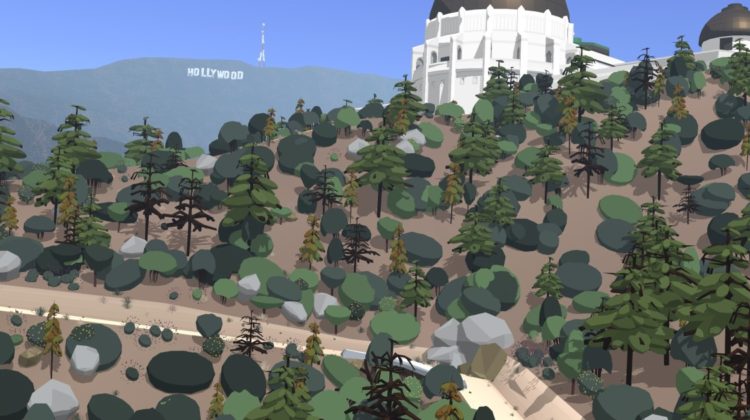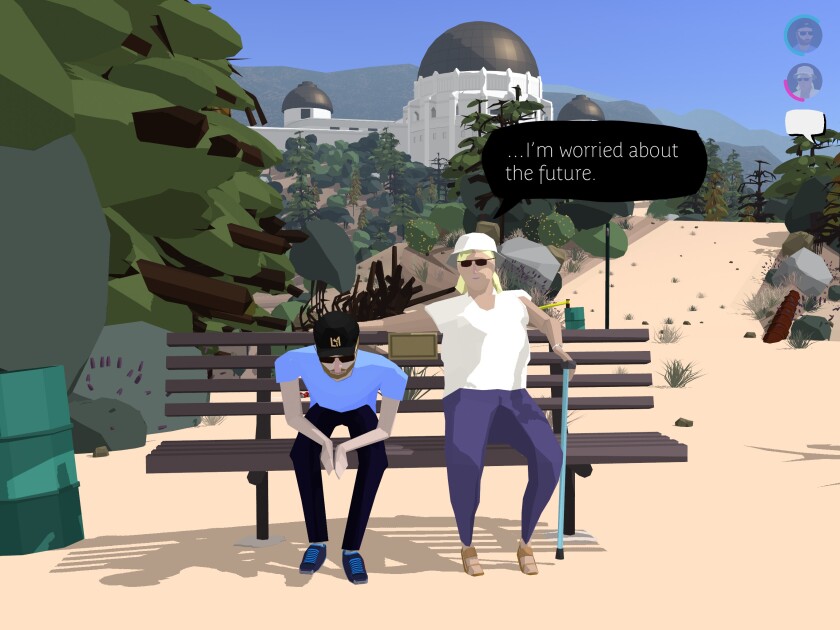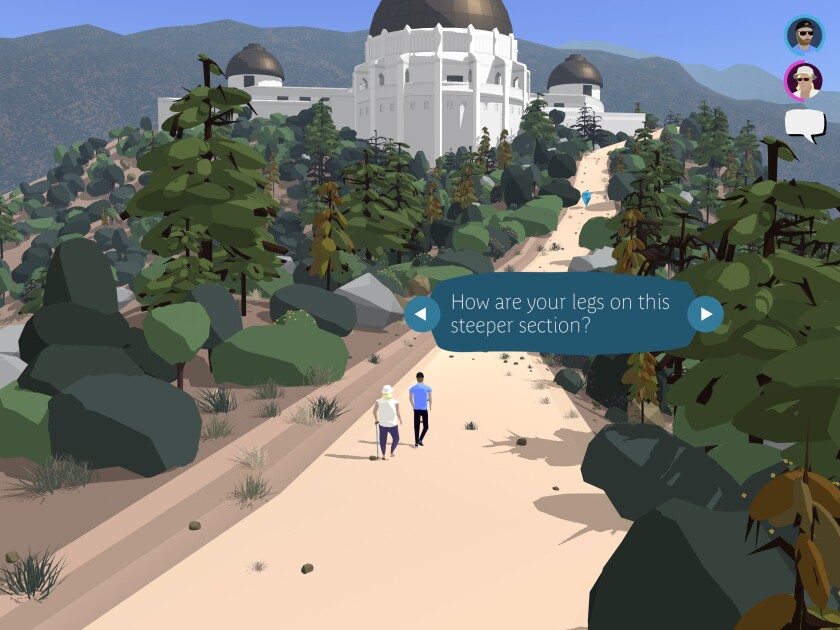
Video games, at their most basic, allow us to partake in activities that we often can’t experience in our real lives. We can jump inside green pipes and toss fireballs in “Super Mario Bros.” In the just-released “Ghost of Tsushima” we can wield a sword and pretend we’re in an Akira Kurosawa film.
And in the mobile vignette of a game “Four Months Earlier” we can go for a relaxing hike in Griffith Park with a family member, an activity that became impossible in our stay-at-home lifestyle of 2020. Bittersweet and reflective, “Four Months Earlier” is based on a true story, and unfolds like a short diary entry, a look back at a day that may not have felt all that pivotal in the moment but is rendered unforgettable by future events.
We know going in to the interactive brief that there is going to be a sadness that drapes the proceedings. “The next 12 months will be the worst year of your life,” reads an opening prompt.
That’s referring to what was essentially 2018 in the life of 41-year-old designer Russell Quinn, although the Echo Park resident admits 2020 may force him to eventually drop that tag line. “Four Months Earlier,” a game that takes about 20 minutes, is ultimately meant to tease the in-development full-length “Linda & Joan,” which Quinn is currently at work on. By the time that game is released, this year may, in fact, hold the “worst year of your life” mantle for too many of us.
Yet “Four Months Earlier” stands on its own, the game equivalent of a poem. Los Angeles is often said to be a city of transplants, and Quinn is no different, having spent the bulk of his life in the English town of Cheltenham and parts of Europe. “Four Months Earlier” shows a mother and son exploring our hilly urban park, making small talk, as many of us have done with visitors, over the notorious history of the park’s founder, Griffith J. Griffith.
But mostly it’s a game about finding comfort in those who know us best, even when we may be drifting apart.

Think of “Four Months Earlier” as a video game poem.
(False Vacuum Games
)
What resonated in the experience was how Quinn’s game gently captured a sense of familiarity as well as moments of guilt. As the two main characters in the game, stand-ins for Quinn and his late mother, Linda, walk to the Griffith Observatory, pausing to chat at a lookout bench, the pair occasionally find a conversational rhythm. But they struggle to maintain it, as talk drifts back to their earlier breakfast meal or Linda’s cancer. The only challenge in the game is making sure Quinn and Linda keep pace with one another; frustrations will mount if the speedier Quinn gets out of earshot.
Though it’s a deeply personal game to Quinn, “Four Months Earlier” is able to capture universal emotions. The game version of Quinn clearly feels bad that his mother has left England and braved her fear of flights. His mother yearns for a connection, attempting to plan a future trip, which Quinn doesn’t commit to because he says he can’t take time off of work. “Four Months Earlier,” thus, is a game about time — how time together shapes us and how time apart alters us, even creating a sense of loneliness in our most important relationships.
“That was kind of the emotion I was going for,” says Quinn, who was previously the digital media director for McSweeney’s and also helped develop acclaimed interactive fiction such as “The Pickle Index” and “The Silent History.” This is his first proper game.
“Most family relationships, if you don’t live in the same space, then you have these brief windows together,” he says. “I feel like most people are kind of disappointed by how they go compared to the idealized version. It’s difficult having conversations with your parents. And it’s difficult for parents to have conversations with their kids. So you have this nice situation, where you have this parent who has flown to the other side of the world to spend time with their child. And it’s a beautiful day, but there are things you need to talk about, and they might not even be serious things, but you don’t want to get annoyed with your parents, and that can be hard, even with the best of intentions.”
The initial plan was to release this short, free game in April, but once COVID-19 started to blanket America and lead to nationwide shutdowns, Quinn fleshed out some of the dialogue to make it a fuller experience. He began the project by wanting to find a way to deal with the aftereffects of losing his mother and grandmother in a span of a couple of weeks. But he started to realize the game could have a deeper emotional resonance in our current climate, when those who do not live in the same city as their families are unsure of when they’ll be able to reconnect.
So he added heft to a scene — a breather that mother and son share at a bench — and when it was all-clear to do so he went back to Griffith Park to walk the trails and capture audio. The field recordings of the park’s breezes and birds make up the bulk of the game’s soundtrack.
“It started to have much more a beginning and an end,” says Quinn, noting that as recently as March “Four Months Earlier” was little more than a teaser for a fuller game. With coronavirus on his mind, however, he started to think that “Four Months Earlier” should be an experience that could carry a narrative on its own.

Ultimately, “Four Months Earlier” is a game about how we spend our time together with loved ones.
(False Vacuum Games
)
He also was stuck at home. So he spent some time tidying up the game’s look, wanting to frame the Griffith Observatory as if he were making a digital painting. The backgrounds, he says, were inspired by English painter George Shaw, whose “beautiful simplicity” helped Quinn set the game’s warm yet quiet tone.
“It became much more of a stand-alone meditation on the parent-child relationship,” he says. “It’s about a parent who is getting older, a parent who his sick, and then the distance. All these themes were bubbling up. That’s when I built out the ending, and it became it’s own vignette of a parent-child conversation.”
When Quinn eventually completes the longer “Linda & Joan,” it will also be a look at how quickly life can change. The complete game will be more of a point-and-click experience in which the character of Quinn must return to his childhood home and care for his mother as she succumbs to cancer. In real life, he ended up returning home for a year, while his wife stayed in Los Angeles to work. He doesn’t want “Linda & Joan” to be a downer, and hopes to instead focus on the small choices we can make to find the best of a bad situation.
Yet he began these games because that year forever altered him.
There’s a moment, depending on the conversational choices one makes, in “Four Months Earlier” where Linda is trying to reconcile what she’s heard of Los Angeles versus the reality.
“The music she likes was recorded here, and all the movies, but I was over the glamour,” Quinn says. “This was just a place to live. Then when I was back in my childhood home, I remember at some point watching a movie by myself when my mother was in hospice. I remember seeing the Fox Searchlight logo come up at the start. I couldn’t even believe I lived in Los Angeles. It felt so far away. It became a fantasy place at that time.”
“Four Months Earlier,” and what will be “Linda & Joan,” were born out of Quinn’s own struggles to reconnect with the reality of the life he built for himself with the one he left behind. He was raised primarily by his mother, and Quinn notes the two were largely inseparable until he began his adult life, and then mostly apart until her final months.
“Coming back to Los Angeles, it was so different to me,” he says. “Everything here was sunny, beautiful and bright and it was so hard to communicate to my friends, even my wife, about what had happened. I wouldn’t make a direct comparison to going to war, but I had underwent a trauma in a different country far away, a place I hadn’t lived for 15 years. All my friends were sympathetic, but I had no one to share this with. I don’t have siblings. I wanted to share this story to feel understood, but also to give other people space to explore those feelings.”
The ultimate goal is to stop players from thinking of the ending. Quinn knows users will be aware of the outcome going in. Think of “Four Months Earlier” as a brief look at how we spend the time we do have together.
“Even though what happened to my family was compressed in a short place of time,” Quinn says, “it’s a real thing that will happen to every family.”
